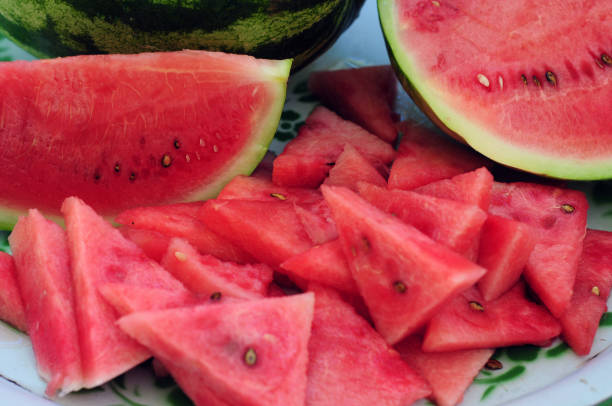Watermelon is a popular fruit that is enjoyed by many people during the summer season. Not only is it delicious and refreshing, but it is also considered to be a low-calorie food. However, the number of calories in watermelon can vary depending on factors such as the size of the fruit and the serving size. In this article, we will explore how many calories watermelon contains and the factors that influence its calorie content.
Watermelon is an excellent source of hydration and is composed of 92% water. It also contains vitamins, minerals, and antioxidants that provide many health benefits. One cup of diced watermelon contains approximately 46 calories. This serving size of watermelon provides 11% of the recommended daily value of vitamin C, 5% of the recommended daily value of vitamin A, and 1% of the recommended daily value of iron.
The calorie content of watermelon can vary depending on the size of the fruit. A small watermelon, which weighs approximately 6 pounds, contains approximately 720 calories, while a large watermelon, which weighs approximately 15 pounds, contains approximately 1750 calories. This means that the calorie content of watermelon can range from 46 calories per cup to about 115 calories per cup, depending on the size of the fruit.
Watermelon is an excellent source of hydration, containing about 92% water by weight. This makes it an ideal food for hot summer days when you need to replenish lost fluids. In addition to its high water content, watermelon is also low in calories, with a 100-gram serving containing only 30 calories. This makes it a great option for anyone looking to maintain a healthy weight or limit their calorie intake.
Despite its low calorie content, watermelon is a nutrient-dense food, providing a range of essential vitamins and minerals. It is a good source of vitamin C, vitamin A, and potassium, as well as antioxidants such as lycopene. These nutrients help to protect against oxidative stress and reduce the risk of chronic diseases, such as heart disease and cancer.
In addition to its low calorie and nutrient-dense properties, watermelon is also a low-fat food, with less than 0.5 grams of fat per 100-gram serving. This makes it a great option for anyone following a low-fat diet or looking to reduce their overall fat intake.
Watermelon is also a low-sugar food, with a 100-gram serving containing only 5.5 grams of sugar. This is a relatively small amount compared to other fruit, making it a suitable option for those looking to limit their sugar intake. Additionally, watermelon has a low glycemic index, which means that it has a minimal impact on blood sugar levels, making it a good option for those with diabetes.
Despite its many health benefits, it is important to remember that watermelon is still a form of sugar, and it should be consumed in moderation as part of a balanced diet. Consuming too much watermelon can lead to weight gain and an increased risk of type 2 diabetes.
Watermelon also contains antioxidants that help to protect the body against damage from free radicals. These antioxidants can help to reduce the risk of chronic diseases, such as heart disease and cancer. Additionally, watermelon is a good source of lycopene, a powerful antioxidant that is found in red fruits and vegetables. Lycopene has been shown to have numerous health benefits, including reducing the risk of heart disease and cancer.
In conclusion, watermelon is a low-calorie food that is a good source of hydration and essential vitamins and minerals. The calorie content of watermelon can vary depending on factors such as the size of the fruit and the serving size. However, one cup of diced watermelon contains approximately 46 calories and provides 11% of the recommended daily value of vitamin C, 5% of the recommended daily value of vitamin A, and 1% of the recommended daily value of iron. Additionally, watermelon contains antioxidants and lycopene, which provide numerous health benefits. So, if you are looking for a low-calorie and nutritious food to enjoy during the summer, watermelon is an excellent choice.

 Home
Home Health
Health Diet & Nutrition
Diet & Nutrition Living Well
Living Well More
More












